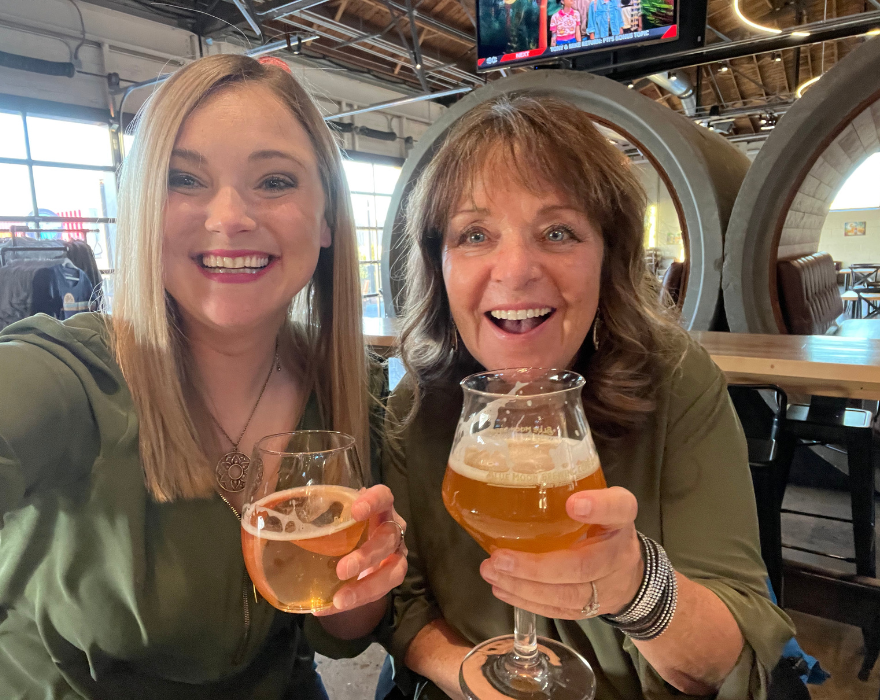As we shift gears from the biggest cannabis holiday event of the year, 4/20, we have our eyes set on Craft Brewers Conference (CBC). Craft Brewers Conference is America’s largest craft brewing industry gathering. The comparable in cannabis is MJBizCon, the world’s largest cannabis conference.
There’s a reason our team works in cannabis and craft beer – there’s a lot of similarities between the highly regulated industries. Hell, there’s similarities in the plants, as hops and cannabis are cousins, sharing the ingredient terpenes. As a team that’s worked in both industries, we can tell you that there is certainly a lot the two industries can learn from each other.
We’ve met a lot of vendors at MJBizCon and other cannabis events who sell equipment to brewers and dispensary owners and help with business operations. The industry intersectionality doesn’t end there, with cannabis technology companies like Alpine IQ investing their money to make their software available for craft brewers. Or, companies like Sorse Technology who helps craft beer and cannabis companies with their proprietary water-soluble terpene emulsification process.
We’re often surprised that more people aren’t looking to craft beer to model their cannabis marketing. It may seem like the alcohol industry has more flexibility, with advertisements on tv, but that wasn’t always the case. And there are still a lot of restrictions with traditional marketing and advertising channels in the craft beer space.
Craft brewers, along with others in the alcohol industry, have been in the game a long time to see the industry evolve. They’ve navigated years of working in a highly regulated industry with limitations around advertising and traditional marketing. Here’s what cannabis business leaders can learn from the craft beer industry:
Community First
The Source Marketing Group values community above all else. What’s the cannabis + craft beer industries without the great people to enjoy it with?! The craft beer industry does a great job at driving community engagement, which builds brand loyalty. Craft breweries have a community first mindset, knowing that a supportive community is the key to a lasting and impactful business.
Let’s take a look at how craft breweries engage their communities and create repeat customers:
Old 121 is a community focused brewery in Lakewood, CO. They’ve been successful by partnering with local businesses, local nonprofits, and by hosting brew runs to engage their local community with family-friendly activities.
Another example is Lady Justice Brewing in Aurora, CO. Lady Justice was built around social justice and creating positive change through their business and activism. They are women and queers in the beer space, breaking stereotypes, ending stigmas, and educating consumers. They host events all year long for their community, from weekly trivia nights, to fundraisers to make donations to local nonprofits. They have built a local following through the unique and inclusive events that they host for their community.
Finally, Denver Beer Co. has a neighborhood hop swap pick up in April for their local community. You register for a pick up, you grow the hops at home, and when you return them later to the brewery, they will reward you with some free beer. You get the experience of growing your own hops, then sit back, enjoy a beer, and let Denver Beer Co. do the hard work of turning them into a delicious wet-hopped IPA this Fall.
The cannabis industry can take some lessons from these books and some already are. Calyxeum in Detroit, MI has multiple community programs where they give back to their local neighborhoods. The Founders also lead a social equity incubator and run a nonprofit. They cultivate cannabis for their business while teaching their local community how to cultivate vegetables.
If you can take anything from these lessons, it is that the businesses who put their community first are the ones who will win, build brand recognition, and build sustainable businesses. Plus, events are a great marketing channel for ROI and brand loyalty. Community focused cannabis campaigns will help you stand out from the rest of the pack and create memorable experiences.
Go Experimental and Experiential
One thing we have learned from the craft beer industry is that you can grow by being a little experimental. As the craft beer market reaches 19.6 billion in sales and holds 18% of the overall beer market, beer drinkers are looking for new, unique approaches to the flavors (source: fareway.com).
The same thing is helping brands stand out within the cannabis industry. Consumers are wanting to try new products that are novelty items that they are not going to use every day, or a new product or flavor. Craft beer is experimental and pulls in raving fans through its unique brand collaborations and flavors. This includes the brand collaboration between Oskar Blues Brewery and Veritas Fine Cannabis.
In an article in MJBizDaily, they describe the collaboration -“Through this collaboration, we’re excited to educate people about the parallels between two Colorado staples – craft beer and cannabis – and the role terpenes play in the experience of both,” Jordan Plunkett, marketing director for Veritas Fine Cannabis, said in the release.
In cannabis, brands like Artsy are using this strategy already for brand differentiation. They are a company that cares about craft cannabis and the arts. They showcase custom art coverings on their product packaging and work with craft cultivators. Dialed In is another example of a brand embracing experimental and craft. They produce small batch products that are exclusive and they typically partner with other local brands. It gets their followers excited, looking forward to new limited-release collaborations.
Going experimental is what sets you apart in cannabis and pulls in people that care about craft quality. It also pulls in new consumers that typically would not have visited your dispensary or tried your brand. Experimentals are a great customer acquisition tactic if promoted correctly.
Promote Responsible Consumption
One way alcohol companies were successful in navigating their highly regulated industry was to focus on marketing campaigns promoting responsible drinking. In the case of cannabis, it would be responsible consumption, signaling to consumers and partners that products are safe and tested. This helps to destigmatize the growing legal markets and remind new and potential customers about safe and moderate consumption.
Right now, there’s craft beer standardized testing which includes alcohol, density, hop aroma, compounds, etc. These types of standardized testing needs to be enforced in cannabis. We see it all the time, budtenders touting THC % instead of educating consumers on the terpene profiles. Besides misinformation, the lack of standardized testing also leads to bad products getting into the hands of consumers. A bad experience with possible moldy weed can detour consumers from recreational cannabis use.
People who are in craft beer and cannabis want standardized testing, not to stifle the industry but to help support the industry. You do not want bad players with their bathtub gin version of cannabis getting in the hands of consumers and diluting your brand reputation. By incorporating these lessons from the craft beer industry, cannabis companies can improve the quality of products and perception of the industry.
Conclusion
We have grown accustomed to beer being more regularly accepted on national television, on social media, and other marketing channels. As we continue to mature the cannabis industry and more markets go legal, we will unlock more marketing capabilities within cannabis. Until then, feel free to repurpose ideas that are working in craft beer so you can market like a badass and win more business.
Are you struggling with navigating marketing within a highly regulated industry? For a free marketing audit, reach out to our team at cannabis@sourcemarketinggroup.com.
Author Profile:

Kristin is the Founder and CEO of The Source Marketing Group. The marketing agency is focused on elevating female-, veteran-, and minority-owned businesses in the cannabis and craft beer space.
